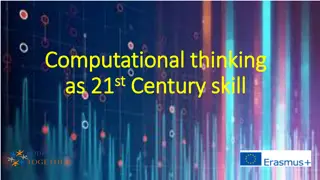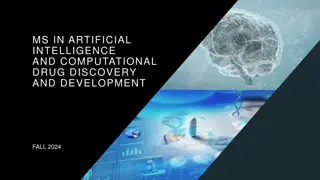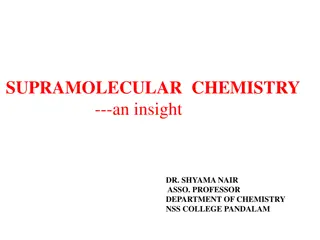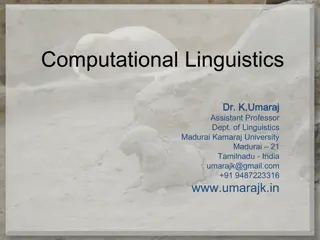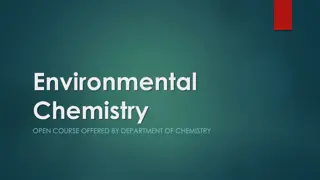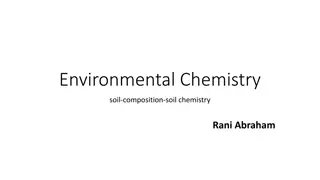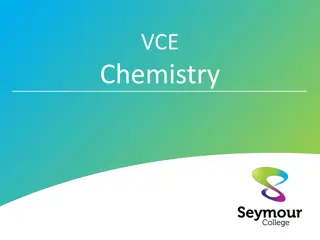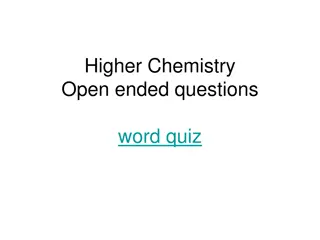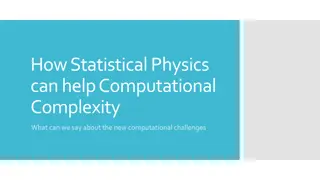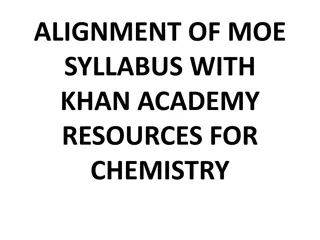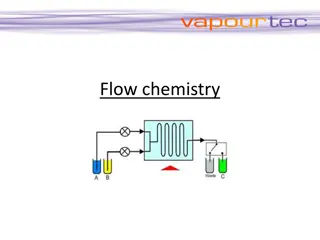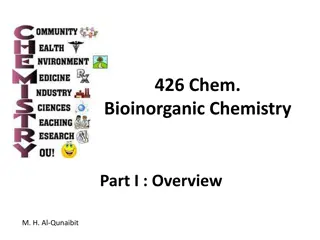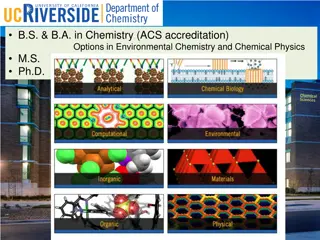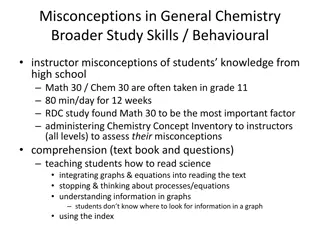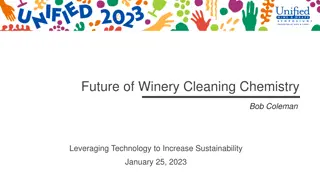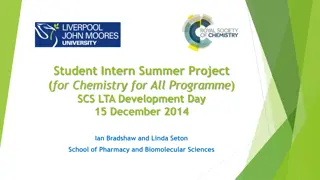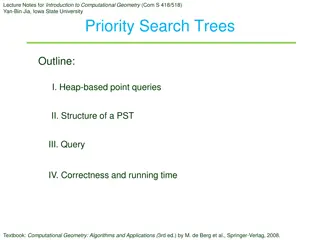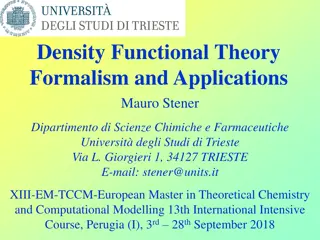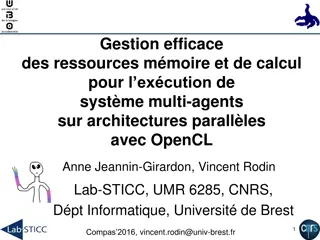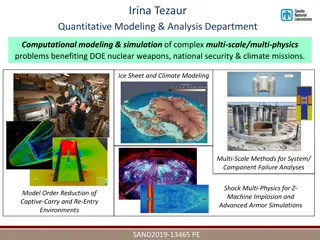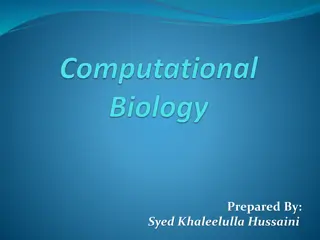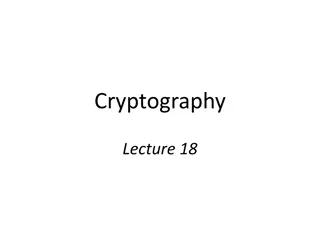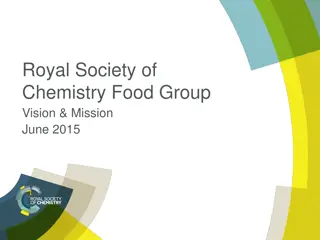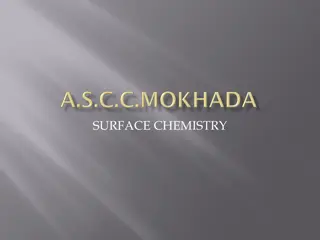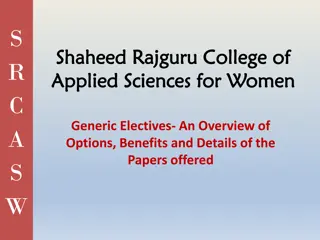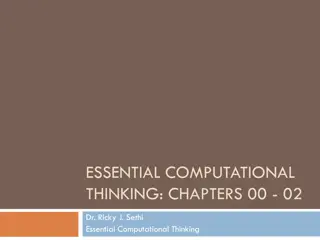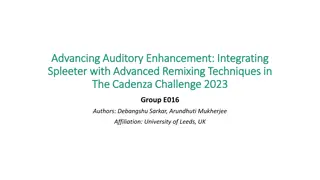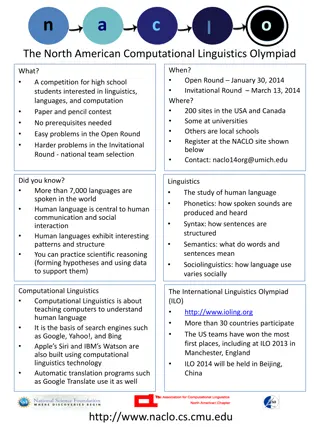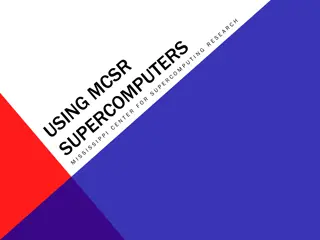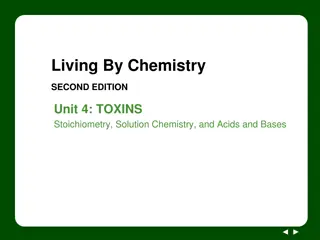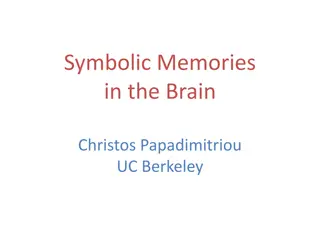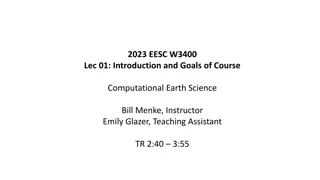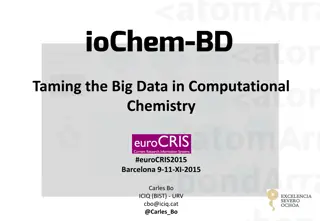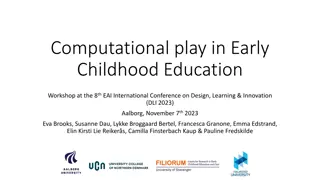Organometallic Chemistry (CHEM 42 1)
Organometallic chemistry delves into compounds with carbon-metal bonds, merging concepts from inorganic and organic chemistry. The field encompasses diverse compounds like ferrocene and tris(triphenylphosphine)rhodium carbonyl hydride, with nomenclature based on naming organic groups and adding meta
1 views • 13 slides
Green Chemistry and the Power of AI: Transforming Industries
Explore the principles and practices of green chemistry, focusing on safe and sustainable chemical processes that prioritize environmental impact. Learn how artificial intelligence is revolutionizing industries by enhancing efficiency, accuracy, and customer experiences. Discover the synergy between
4 views • 10 slides
Introduction to Chemistry: Matter, Energy, and Measurement
Chemistry is the study of matter, its properties, and the changes it undergoes. This content covers the basics of chemistry, including the classification of matter into pure substances and mixtures, different states of matter, and the building blocks of matter such as atoms and molecules. Sample exe
5 views • 51 slides
Introduction to Co-ordination Chemistry: Fundamentals and Applications
Explore the fascinating field of coordination chemistry, delving into the complexity of compounds and the coordination bonds that govern their structures. Discover the history, key concepts, and applications of coordination chemistry through a detailed examination of coordination compounds, bonding
13 views • 73 slides
Fuel Your Success Conquer the IB Chemistry (SL and HL) Examination
Ignite your potential and achieve excellence in the IB Chemistry (SL and HL) Examination with our comprehensive study resources. Access practice exams, study guides, and expert guidance to excel in your test. Start your journey towards academic success today!\nClick Here to Get IB-Chemistry Dumps Wi
4 views • 6 slides
Computational thinking as 21st Century skill
Computational thinking is a critical skill for the digital age, involving problem-solving techniques that enable computers to process information effectively. It precedes programming and requires breaking down complex problems into manageable steps. Educators emphasize computational thinking exercis
7 views • 4 slides
Master's Program in Computational Drug Discovery and Development - Fall 2024 Curriculum
This Master's program offers a comprehensive curriculum focusing on Artificial Intelligence, Computational Drug Discovery, and Development. With a blend of cutting-edge technologies and practical applications, students delve into techniques, AI/ML, big data mining, modeling, and more. Through intens
1 views • 7 slides
Exploring Supramolecular Chemistry: Insights and Applications
Supramolecular chemistry delves into the chemistry of molecular assemblies, intermolecular bonds, and non-covalent interactions, leading to the formation of supra-molecules through aggregation of molecular subunits. Concepts like molecular recognition, self-organization, and host-guest chemistry pla
0 views • 18 slides
Understanding Computational Linguistics and Natural Language Processing
Explore the fascinating fields of Computational Linguistics and Natural Language Processing (NLP), delving into their development, applications, and significance. Learn about the study of human languages in computational models, the importance of corpora in linguistic research, and the various types
1 views • 33 slides
Environmental Chemistry Open Course: Understanding Pollution and Control Measures
Dive into the world of environmental chemistry with this comprehensive open course offered by the Department of Chemistry. Explore the causes, effects, and control measures of air, water, soil, noise, thermal, light, and radioactive pollutions. Gain insights into pollution terminology, water quality
3 views • 9 slides
Understanding Soil Chemistry and Redox Reactions in Environmental Chemistry
Soil chemistry plays a crucial role in sustaining healthy soils by influencing nutrient availability through oxidation and reduction processes. Redox reactions in soil are impacted by factors like oxygen content and water presence, affecting nutrient supplies. The redox status of soil reflects its n
1 views • 92 slides
Explore Chemistry with Seymour College - VCE Chemistry Course Overview
Dive into the world of chemistry with Seymour College's VCE Chemistry course. Discover the nature of matter, chemical reactions, design innovation, and carbon compounds. Explore diverse pathways in environmental technology, academia, health sciences, and more. Prepare for a challenging yet rewarding
0 views • 5 slides
Understanding Chemistry through Open-Ended Questions
The content provides a detailed assessment of student responses to open-ended chemistry questions related to hydrogen peroxide and its applications in teeth whitening gels. Various student answers are analyzed based on their understanding of the chemistry concepts involved, with explanations given f
1 views • 18 slides
Understanding Computational Complexity Through Statistical Physics
In the age of vast data growth, tackling complex computational problems is crucial. Statistical physics can provide insights into handling the new challenges arising from the exponential increase in data. As we delve into understanding the complexity of computational tasks, it becomes evident that e
0 views • 24 slides
Comprehensive Alignment of MOE Chemistry Syllabus with Khan Academy Resources
This comprehensive alignment showcases the correlation between the Ministry of Education (MOE) chemistry syllabus and the educational resources provided by Khan Academy. It covers various topics in chemistry such as the particulate nature of matter, atomic structure, chemical bonding, stoichiometry,
1 views • 9 slides
Understanding Flow Chemistry for Efficient Chemical Reactions
Flow chemistry, also known as continuous flow or plug flow chemistry, revolutionizes chemical reactions by running them in a continuous flow stream. This dynamic process offers efficient manufacturing of chemical products with precise control over critical parameters like stoichiometry, mixing, temp
2 views • 7 slides
Exploring Bioinorganic Chemistry: Connecting Inorganic and Biochemistry
Bioinorganic Chemistry bridges the gap between inorganic chemistry and biochemistry, understanding the vital role of inorganic elements in living systems. This interdisciplinary field delves into the structure, function, and exploitation of metal ions in biological processes, emphasizing their inter
0 views • 47 slides
UC Riverside Chemistry Program: Excellence in Education and Research
UC Riverside's Chemistry Program offers a range of options in ACS-accredited Chemistry education, with highlights including a distinguished faculty, substantial research funding, and high rankings. The program also boasts a Nobel Prize-winning faculty member and a comprehensive curriculum that cover
0 views • 5 slides
Overcoming Misconceptions in Chemistry Education
Addressing misconceptions in general chemistry education, focusing on student knowledge from high school Math and Chemistry courses. Emphasis on student motivation, learning strategies, and common misconceptions in understanding scientific concepts. Strategies for enhancing comprehension, applicatio
0 views • 12 slides
Innovations in Winery Cleaning Chemistry for Sustainability
Explore the future of winery cleaning chemistry through leveraging technology and sustainable practices. Considerations for chemistry selection focusing on safety, hazardous materials, employee well-being, and environmental impact are highlighted. Current cleaning chemistry practices, including the
0 views • 19 slides
Overview of LJMU Chemistry for All Programme Summer Internship Project
LJMU's Chemistry for All Programme aims to enhance student experiences through summer internships, curriculum development, and outreach activities. The project, funded by the Royal Society of Chemistry, involves a cross-university collaboration to engage local schools and foster interest in chemistr
0 views • 21 slides
Introduction to Priority Search Trees in Computational Geometry
This lecture outlines the structure and query process of Priority Search Trees (PST) in computational geometry. It covers heap-based point queries, range trees for windowing queries, handling query ranges in 1D and 2D spaces, and using heaps to efficiently handle query ranges. The content discusses
1 views • 18 slides
Understanding Density Functional Theory in Computational Chemistry
Dive into the formalism and applications of Density Functional Theory (DFT) through a comprehensive review of basic theory, equations, and numerical implementations. Explore concepts like Time-Dependent DFT (TDDFT) and Linear Response formalism, and discover its applications in studying plasmons, co
0 views • 26 slides
Efficient Resource Management for Multi-Agent System Execution on Parallel Architectures with OpenCL
This research focuses on efficiently managing memory and computing resources for executing multi-agent systems on parallel architectures using OpenCL. The study presents a hybrid approach involving population-level molecular virtual chemistry and individual-level virtual cells. The work enhances a p
1 views • 33 slides
Advancing Computational Modeling for National Security and Climate Missions
Irina Tezaur leads the Quantitative Modeling & Analysis Department, focusing on computational modeling and simulation of complex multi-scale, multi-physics problems. Her work benefits DOE nuclear weapons, national security, and climate missions. By employing innovative techniques like model order re
0 views • 6 slides
Understanding Computational Biology: Proteins, DNA, RNA, Genetics, and Evolution
Computational Biology combines computational methods with molecular biology to solve biological problems. Explore topics like proteins, DNA, RNA, and genetics, learning about amino acids, nucleotides, and the genetic code. Understand the evolutionary processes of mutation and natural selection.
0 views • 21 slides
Introduction to Computational Number Theory in Cryptography
Practical private-key cryptography can be done without advanced math, but understanding computational number theory is essential for public-key encryption. This field focuses on the computational difficulty of problems, analyzing algorithms' running times, classifying problems as easy or hard based
0 views • 27 slides
Royal Society of Chemistry Food Group Vision & Mission Summary
The Royal Society of Chemistry Food Group aims to lead, promote, and disseminate the understanding and importance of chemistry in food. Their vision is to enhance food and nutrition security through advancing the chemistry of food ingredients. They strive to engage with various communities to promot
0 views • 4 slides
Understanding Surface Chemistry and Adsorption Phenomena
Surface chemistry is a crucial branch of chemistry that focuses on the chemical processes occurring at interfaces between different surfaces like solid-liquid, solid-gas, and liquid-gas. This field plays a significant role in various industries, including electronics. Adsorption, absorption, and sor
0 views • 15 slides
Chemistry 1151K Course Overview and Chapters Summary
Upon completion of the CHEM 1151K course, students will apply the scientific method to investigate chemical questions in allied health, utilize dimensional analysis to solve quantitative problems, communicate effectively using chemical terminology and symbols, describe the behavior of biochemical so
0 views • 44 slides
Biochemistry and Chemistry Elective Courses Overview at SRCASW
The Shaheed Rajguru College of Applied Sciences for Women offers elective courses in Biochemistry and Chemistry. The Biochemistry course covers biomolecules like amino acids, proteins, carbohydrates, lipids, and nucleic acids, emphasizing their properties and functions. It also includes practical ex
0 views • 19 slides
Understanding the Essence of Computer Science and Computational Thinking
Delve into the fundamentals of Computer Science and Computational Thinking through chapters discussing the nature of science, predictions in physics, and the distinction between Computer Science and Computer Information Systems. Explore the relationships between Math, Physics, and Computer Science i
0 views • 29 slides
Advancing Auditory Enhancement: Integrating Spleeter with Advanced Remixing Techniques in The Cadenza Challenge 2023
Our project for The Cadenza Challenge 2023 focused on improving audio for headphone users with hearing loss by integrating Spleeter's deep learning capabilities. We utilized N-ALR prescriptions, Butterworth bandpass filters, and Dynamic Range Compression to enhance audio quality. By leveraging advan
0 views • 19 slides
North American Computational Linguistics Olympiad: A Competition for High School Students
The North American Computational Linguistics Olympiad (NACLO) is a competition for high school students interested in linguistics, languages, and computation. It consists of an Open Round in January and an Invitational Round in March, with no prerequisites needed. Participants tackle easy problems i
0 views • 4 slides
Mississippi Center for Supercomputing Research (MCSR) Overview
The Mississippi Center for Supercomputing Research (MCSR) supports computational research in various fields like Chemistry, Bioinformatics, Physics, Engineering, and Computer Science for Mississippi IHLs. They provide training to optimize computational resources, offer classes for computational trai
0 views • 23 slides
Understanding Molar Mass and Conversions in Chemistry
Explore the concept of molar mass, moles of atoms, and conversions between mass and moles in chemistry through an engaging lesson on toxins, stoichiometry, solution chemistry, and acids and bases. Learn how to calculate molar mass, describe the magnitude of a mole of a substance, and conduct simple
0 views • 10 slides
Exploring Computational Theories of Brain Function
In this series of images and text snippets, the discussion revolves around the emerging field of computational theories of brain function. Various aspects such as symbolic memories, the relationship between the brain and computation, the emergence of the mind from the brain, and computational thinki
0 views • 53 slides
Computational Earth Science Course Overview
Explore the world of Computational Earth Science with Bill Menke as the instructor and Emily Glazer as the teaching assistant. The course aims to help you become proficient in applying Python-based computational methods to understand dynamic Earth Science phenomena. Through modeling, you will gain i
0 views • 34 slides
Revolutionizing Computational Chemistry Data Management
Empowering researchers in computational chemistry to efficiently handle big data challenges, improve workflows, ensure data integrity, and set common standards through innovative tools and protocols.
0 views • 32 slides
Exploring Computational Play in Early Childhood Education: DLI 2023 Workshop
The workshop at the 8th EAI International Conference on Design, Learning & Innovation (DLI 2023) in Aalborg aims to delve into the application of computational play with mathematics in early childhood education. Through live sessions and discussions, opportunities and challenges in utilizing computa
0 views • 7 slides





